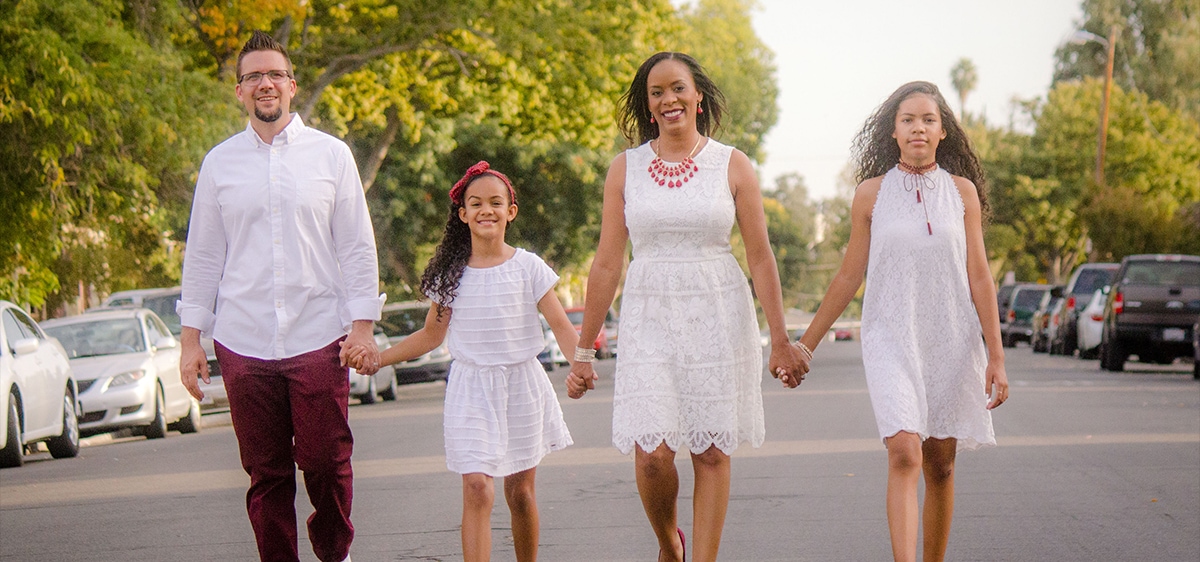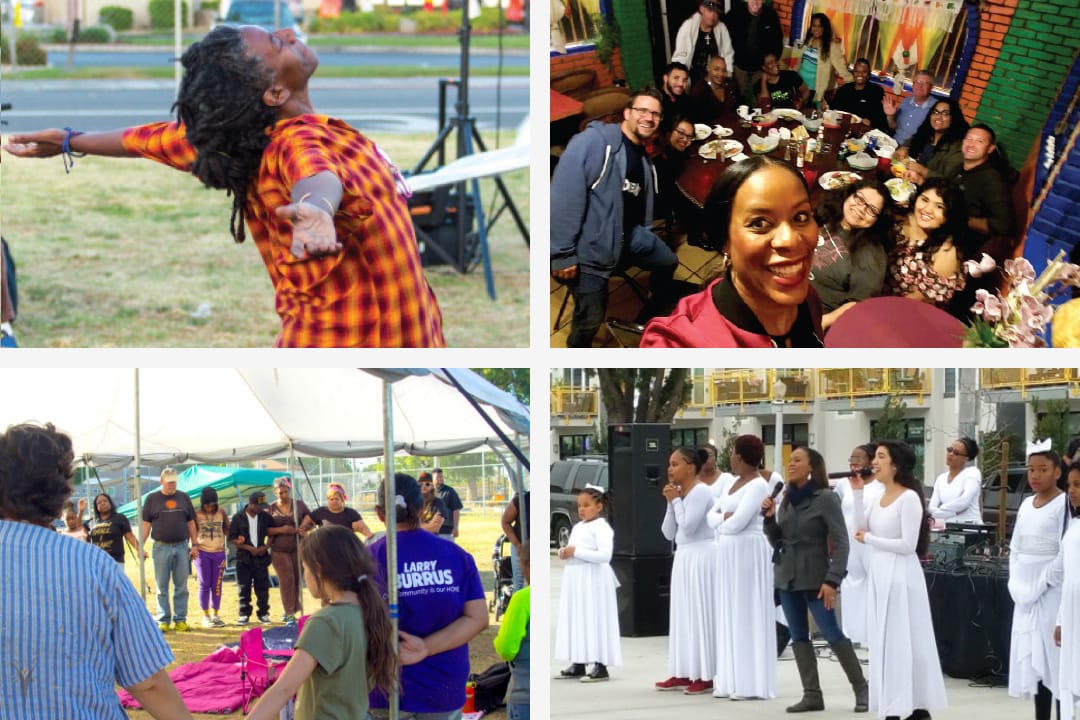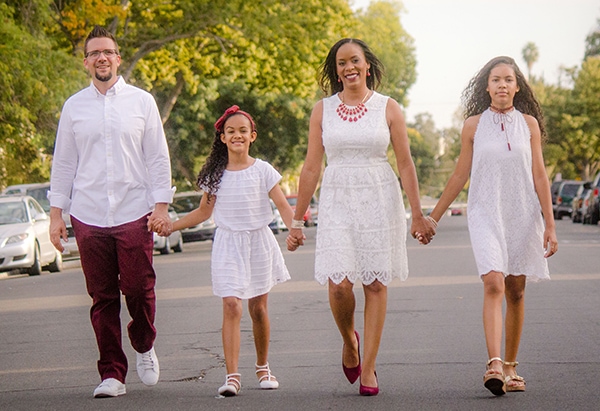[vc_row][vc_column][vc_column_text]

[/vc_column_text][/vc_column][/vc_row][vc_row el_class=”hero-header-text”][vc_column][vc_column_text]
The Word on the Street
How On Ramps Covenant Church is Transforming Parish Ministry
by Jill Riley | July 18, 2018
[/vc_column_text][/vc_column][/vc_row][vc_row][vc_column][vc_column_text]
Phil and Rici Skei and their daughters, Kaylin and Kadence (Pictured above)
Phil and Rici Skei did not set out to plant a church.
Twelve years ago Phil was working for Intervarsity Christian Fellowship as the executive director of their Fresno Institute for Urban Leadership. Part of the requirements of his job was that they would live in one of Fresno’s neighborhoods of concentrated poverty.
Initially Rici resisted. “I grew up in one of these neighborhoods. Why would I want to go back?” she says. She describes it as a battle with God. “Obviously at the end of two weeks, God won. It was like he said, ‘If you don’t seek the well-being of this area, who will?’”
They moved to the Lowell neighborhood, an area referred to as “The Devil’s Triangle.”
“The first murder of 2007 happened in the alley directly behind our house,” says Phil.
They joined their neighbors, who were already organizing for change. “We found ourselves at the forefront of neighborhood association leadership,”
Phil says. Conversations were happening about community development, housing, and neighbor hood issues, but no one was specifically focused on spiritual development in the community. “We began to understand that part of our call was to shape the spiritual fabric of the neighborhood,” he says.
Soon they were thinking about starting a church. Rici began researching denominations and found the Covenant. The more they read the more they liked what they saw. “The fact that the Covenant allocated resources to write dozens of affirmations around justice issues signaled to us that this denomination was not just giving lip service to these concepts,” Phil says. “We deeply appreciated the time and intentionality the denomination gave to this important work. Also, the stance on women in ministry
was important to us, and we loved the way the Covenant referred to the diversity of ministry as a ‘mosaic of churches.’ This resonated with how we felt about diversity in the body of Christ.”
Early on, they received offers of two buildings to use for the church at no cost. “We turned them down,” says Rici. “They weren’t in our neighborhood and that wasn’t consistent with our ministry convictions. We wanted to be in the neighborhood where we live.” Instead, On Ramps Covenant Church met outside in a park for more than a year. Currently they rent worship and office space from World Impact, a Christian missions organization.
As they prayed and planned, they began to grasp the enormity of their mission field. To get a handle on it, they broke their neighborhood down into bite-sized pieces. They called those pieces parishes. Unlike the traditional concept of one parish per community, they identified several parishes within their neighborhood. Each street is its own parish.
The church gathers as a whole each week for worship, but the street parishes are the primary avenue of ministry and relationship. The multiethnic congregation is largely Latino and African American. Parish ministry builds on the ethnic culture of intentionally gathering to eat, celebrate, mourn, and live as community.
Street parish leaders meet regularly to pray together and be mentored. They are each uniquely attuned to the needs within their parish. “If there is a six-year-old’s birthday party on say, Calaveras Street, we decide with the family and the parish leadership how many hot dogs are needed and the church provides them. If the family wants our bounce house for the party or if we can do anything else to serve the family, we reach out. The leaders of that street parish show up at that party and take part in the celebration,” says Rici. Since most of the members of On Ramps live in the neighborhood, they are connected and able to respond to ministry needs in timely ways.
The Skeis call their way of thinking “contempor-ancient.” “We are trying to reach a generation of evangelicals who are searching for something deeper. We are looking for an orthodox expression and we believe this is a sort of new reformation. We are learning from the great things God is doing in this generation and also learning from God’s work historically. The parish model is a product of our learning and passion for people,” Phil says.
Everyone in our neighborhood knows that when someone is hurting Pastor Phil and Rici go to love on them.

The street parishes and their leadership are ground zero not only for celebrations but also for crises and emergencies, and not only for those who attend the church. “If there is a death, the whole church will pray, grieve, and mourn with the family, but it is the street parish that will be front and center in ministering. The leaders of the parish touch base with other families if they see police cars or something unusual happening, just to give support to one another,” says Rici.
Being present in the community is paramount to their ability to minister to the neighborhood. They still hold a service in the park once a month. “Some people come to that service faithfully who would never step inside the church building,” explains Rici. “We move everything to the park and even baptize people there. When the water fountain wasn’t working, we baptized believers in the spray park.”
When Paul Wilson, superintendent of the Pacific Southwest Conference, visited On Ramps, he discovered firsthand the difference the church is making in the community. “I asked a young man how he became a part of the church, and he told me the story of a terrible loss his family had suffered,” Wilson says. “The day of the loss Phil and Rici showed up at the front door with a loaf of freshly baked bread. The Skeis then prayed with the family. I asked who had asked them to come over. He looked bewildered: ‘Everyone in our neighborhood knows that when someone is hurting or something really goes wrong Pastor Phil and Rici go to love on them.’ He went on to explain that soon after he met Jesus through On Ramps.”
“Matthew 13:52 really speaks to me,” says Phil. “The gospel speaks of bringing forth the new treasures as well as the old. This is the tension we live in.” He adds, “If we minister as Jesus did, not from a place of privilege but incarnationally, we are able to change and shape our culture.”
The incarnational approach and cooperation with other government, education, and faith-based organizations has had results. In the past decade, crime has dropped 48 percent in the Lowell neighborhood.
A bivocational minister, Phil currently works as the neighborhood revitalization manager for the city of Fresno. In that role he works with code enforcement officers, community coordinators, school district offices, and the mayor’s office to uplift and revitalize the most deteriorated parts of the city. “I get to work with other churches every day. It isn’t just the physical and housing plight of the city that need uplifting. It is also the spiritual conditions. It is a blessing that I get to facilitate and coordinate that process. We have revitalized twelve neighborhoods out of forty-six planned.”
While the Skeis acknowledge that the work will take continued tenacity, education, and time, they are committed to working together with their neighborhood to influence and shape the hearts of not only their neighborhoods and people but also of others like themselves who are eager to serve the kingdom amid our culture today.
[/vc_column_text][/vc_column][/vc_row]














